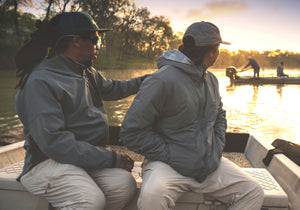Fly fishing is not just a pastime; it's a passion that unites tranquillity and excitement in the heart of nature. Yet, like any outdoor activity, it demands a certain level of fitness to fully enjoy and excel at it. Orvis, a brand synonymous with quality fly fishing equipment, advocates for the integration of fitness into the fly fishing lifestyle. Embracing fitness routines tailored to the unique demands of fly fishing can enhance your performance, increase your endurance, and make your time on the water even more rewarding.
The Importance of Fitness in Fly Fishing
Fly fishing is an art that involves more than just casting a line; it's a holistic experience that engages various muscle groups and requires mental sharpness. The repetitive motions of casting, the stability needed for wading through streams, and the endurance for long days out on the water highlight the need for a targeted fitness regime. A well-rounded fitness plan can prevent injuries, improve casting efficiency, and enable you to navigate challenging terrains with ease.
Core Strength and Stability
A strong core is fundamental in fly fishing. It aids in maintaining balance while wading through uneven and slippery substrates and provides the necessary stability for accurate and powerful casts. Exercises like planks, Russian twists, and leg raises not only fortify your core muscles but also enhance your overall balance and stability.
Upper Body Endurance and Strength
The repetitive nature of casting can be demanding on the shoulders, arms, and upper back. Incorporating strength training exercises such as rows, pull-ups, and shoulder presses can build endurance and reduce the risk of strain. Additionally, flexibility exercises like yoga or dynamic stretching can improve range of motion, making casting smoother and more efficient.
Lower Body Strength and Agility
Navigating riverbanks, streams, and lakeshores requires agility and leg strength. Squats, lunges, and calf raises strengthen the lower body, while agility drills can improve your ability to move quickly and safely over uneven terrain. This not only enhances your fishing experience but also contributes to your overall safety on the water.
Cardiovascular Fitness
Fly fishing often involves hiking to remote spots and spending long hours on the water, which requires good cardiovascular health. Regular cardio activities like running, cycling, or even brisk walking can increase your stamina, ensuring you have the energy for those dawn-to-dusk fishing adventures.
Tailoring Your Fitness Routine
While generic fitness routines provide overall benefits, tailoring your regime to focus on the specific demands of fly fishing can yield significant improvements in your performance. Incorporate a mix of strength training, flexibility exercises, and cardiovascular workouts, keeping in mind the movements and endurance required for a successful day of fly fishing.
Sample Workout Plan for Fly Fishers
- Monday: Upper body strength training focusing on shoulders and back
- Tuesday: Cardiovascular workout (e.g., running, cycling)
- Wednesday: Core strengthening and flexibility exercises
- Thursday: Rest or light activity (e.g., walking)
- Friday: Lower body strength and agility training
- Weekend: Active rest with lighter activities or practising fly fishing techniques
Mental Fitness and Fly Fishing
The mental aspect of fly fishing, such as the patience to wait for the right moment to cast or the focus required to read the water, is as crucial as physical fitness. Engaging in mindfulness practises or meditation can enhance your mental sharpness, improve concentration, and elevate your fly fishing experience to new heights.
Nutrition and Hydration
Maintaining a balanced diet and staying hydrated are key components of staying fit for fly fishing. A diet rich in lean proteins, whole grains, fruits, and vegetables provides the energy needed for those long days on the water. Proper hydration is equally important, especially during the warmer months, to prevent fatigue and maintain concentration.

